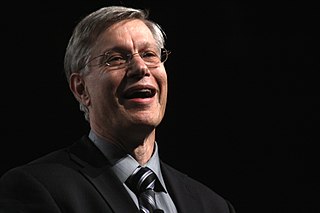A Quote by Robert Heilbroner
Karl Marx did not call for an opposition to the forces of history. On the contrary he accepted all of them, the drive of technology, the revolutionizing effects of democratic striving, even the vagaries of capitalism, as being indeed the carriers of a brighter future.
Related Quotes
To paraphrase Karl Marx, the great Karl Marx, a specter is haunting the streets of Copenhagen...Capitalism is the specter, almost nobody wants to mention it...Socialism, the other specter Karl Marx spoke about, which walks here too, rather it is like a counter-specter. Socialism, this is the direction, this is the path to save the planet, I don't have the least doubt. Capitalism is the road to hell, to the destruction of the world.
For nearly two centuries, scholars and politicians have debated the future of capitalism. Its critics, most prominent among them Karl Marx, have seen capitalism as intrinsically unstable, full of contradictions that will lead eventually to its collapse. Its supporters see it as the best way to allocate resources and rewards. Some even hint that the democratic capitalistic society is not just a phase in the historical evolution of economic systems but its ultimate end.
After reading The Great Transformation by Karl Polanyi, I realized that capitalism did not naturally grow as [Karl] Marx would imply by his theory of historical materialism. People were dragged into capitalism screaming, shouting, and fighting all along the way, trying to resist this industrial and commercial world.
There's a sense in which Marx does contribute to the fund of human knowledge, and we can no more dismiss him than we can [George] Hegel or [Jean-Jacques] Rousseau or [Baruch] Spinoza or [Charles] Darwin; you don't have to be a Darwinian to appreciate Darwin's views, and I don't have to be a Marxist to appreciate what is valid in a number of [Karl] Marx's writings-and Marx would call that a form of simple commodity production rather than capitalism.
Do you call the people in Los Angeles in the nineties - do you call them rebels or opposition ? They are rebels. They are not rebels even, they are beheading. This opposition, opposing country or government, by beheading ? By barbecuing heads ? By eating the hearts of your victim ? Is that opposition ? What do you call the people who attacked the two towers on the 11th of September ? Opposition ? Even if they're not Americans, I know this, but some of them I think have nationality - I think one of them has American nationality. Do you call him opposition or terrorist ?
Karl Marx left it to others to find the way beyond capitalism to a higher form of society. He saw his role as giving them as accurate a theory as he could of how capitalism works, which would also show them the reasons why it needs to be abolished and replaced by a freer and more human form of society.
What is the elephant in all our rooms? It is the global triumph of capitalism. Democracy is fiercely disputed. Freedom is under threat even in old-established democracies such as Britain. Western supremacy is on the skids. But everyone does capitalism. Americans and Europeans do it. Indians do it. Russian oligarchs and Saudi princes do it. Even Chinese communists do it... Karl Marx would be turning in his grave. Or perhaps not, since some of his writings eerily foreshadowed our era of globalised capitalism. His prescription failed but his description was prescient.
Capitalism can be alright, I mean Karl Marx didn't live to see what Roosevelt did with that Depression. He pulled everybody out of that Depression and everybody hated Franklin Roosevelt. He got into office four times. One after the other, with everybody saying, he can't get in again. Everybody voted for Roosevelt four times and he did a hell of a lot.

































